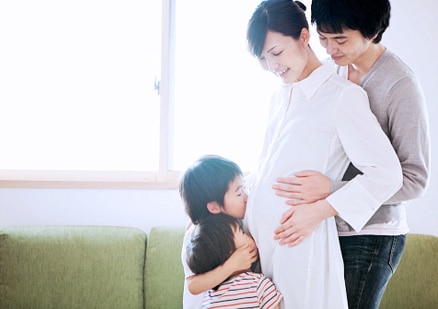What to expect
Sometimes expecting a bundle of joy can make you a bundle of nerves. Knowing what to expect can help you prepare for the joys and challenges ahead, and be an active, involved, and supportive partner.
The first trimester (weeks 1 through 12)
These early weeks can be rough. Hang in there!
What your partner might experience:
- Exhaustion and nausea. The phrase “morning sickness” is kind of misleading, because she could experience it at any time of day. Or night.
- Sensitivity to smell. Even the scent of her favorite flowers might make her feel sick.
- Strange food cravings.
- Frequent trips to the bathroom.
- Changes in desire. She might be more — or less — interested in sex.
What you can do:
- Focus on being there for your partner. Learn as much as you can about how her body is changing and how your baby is developing.
- Go with her to prenatal appointments. Sometimes showing your support is as easy as showing up.
- Ask her about how being pregnant feels so you can track changes — and milestones — together.
The second trimester (weeks 13 through 27)
This is usually a happy time when mom-to-be is feeling better.
What your partner might experience:
- Her energy is starting to come back.
- Morning sickness isn’t as bad.
- She’s making fewer trips to the bathroom.
- She’s feeling hungry. For good reason! The baby is growing fast, and good nutrition is essential for healthy development.
- People are making a fuss over her, especially if her baby bump is starting to show.
- She’s getting pregnancy advice from family, friends, and even strangers on the street. Remind her to take advice from her care team to heart, and advice from others with a grain of salt.
What you can do:
- Enjoy this time together. Go out on dates. Hold hands.
- Plan a “babymoon.” Consider taking some time to get away together while it’s still comfortable for your partner to travel and the baby’s due date is far away.
- Prepare for parenthood as a team by taking a class.* That way you’ll be ready to jump in and help out whenever you need to once the baby’s here.
- Talk about labor and delivery options, and keep a list of questions to ask us at each prenatal appointment.
- Tour the hospital where your baby will be born.
The third trimester (weeks 28 through 40)
A lot happens during this stage. Your baby’s due date is getting closer, and you and your partner are getting excited!
What your partner might experience:
- Difficulty getting — or staying — comfortable. Your baby is big now, and your partner is feeling it.
- Heartburn, backaches, leg cramps, and sleep problems are common, as well as some symptoms she experienced at the beginning of her pregnancy.
- Braxton Hicks contractions — a kind of false labor that prepares her body for delivery.
What you can do:
- Make sure you can recognize the signs of labor.
- Write a birth plan together so you can advocate for your partner on delivery day.
- If you have other kids, make plans for someone to stay with them while you and your partner are in the hospital. Work together to make a child care game plan — and make sure they know you might need them in the middle of the night!
- At least 3 weeks before your baby is due, make sure everything is packed and ready for the hospital.
- Pack a hospital bag with everything you’ll need on delivery day.
- Help your partner make a “push playlist” — music to help her get through labor.
- Ask if she wants to bring anything special to the delivery room. A favorite pair of slippers, a picture of a family member — whatever will make her feel comfortable or comforted.
- Think of little ways to show her she’s loved and supported, and get ready for the big day. It’s almost here!
Learn what to expect on delivery day
Learn what to expect when your baby comes home.
*Some classes may require a fee.
Northern California members:
Visit Your Pregnancy to sign up for prenatal classes, get weekly emails, view and prepare for appointments, and more.
Learn about CenteringPregnancy®, a unique prenatal care program that includes group support with other new moms.


